(archive)
Ioanykiy Galiatovskyi
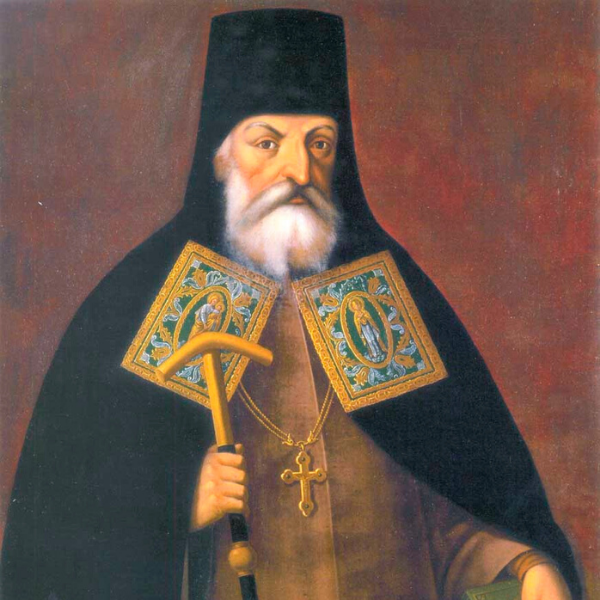
Galiatovskyi Ioanykiy (b. 1630, place of birth unknown – 12.01.1688, Chernihiv) – a scientist, writer, preacher, teacher, church activist; a graduate, professor, and Rector of Kyiv-Mohyla Collegium. He was presumably born in Volyn. In the 1640’s he studied at the Kyiv-Mohyla Collegium. After his studies, having accepted monasticism, he served in the Kupyatytsia Monastery near Pinsk. In 1655, on the invitation of his teacher, Lazar Baranovych, he returned to Kyiv and taught a course of rhetoric at the Kyiv-Mohyla Collegium. In 1658 he became Rector of the Kyiv-Mohyla Collegium and Hegumen of Kyiv Epiphany Monastery. In 1658-1662, he rebuilt the monastery and the collegium which were severely destroyed by fire. In the years of 1665-1668 he travelled to Podillia, Volyn, Galicia, Lithuania. From 1669 he was Hegumen, later Archimandrite of Chernihiv Yelets Assumption Monastery. He died and was buried in Chernihiv.
While working at the Kyiv-Mohyla Collegium, he prepared and published a collection of sermons The Key to Understanding, in which he included the first national homily course, “Science, or the way of composing a homily,” outlining the theoretical foundations of the Ukrainian church sermon and making recommendations for composing their genres. During the life of Ioanykiy Galiatovskyi the book was published four times in Kyiv (1659, 1660) and Lviv (1663, 1665). Ioanykiy Galyatovskyi is the author of 20 sermons, polemical and theological treatises, and collections of short stories in Ukrainian and Polish.
Source: Kyiv-Mohyla Academy Reflected in Names: XVII-XVIII, 2001.
Read moreLazar Baranovych
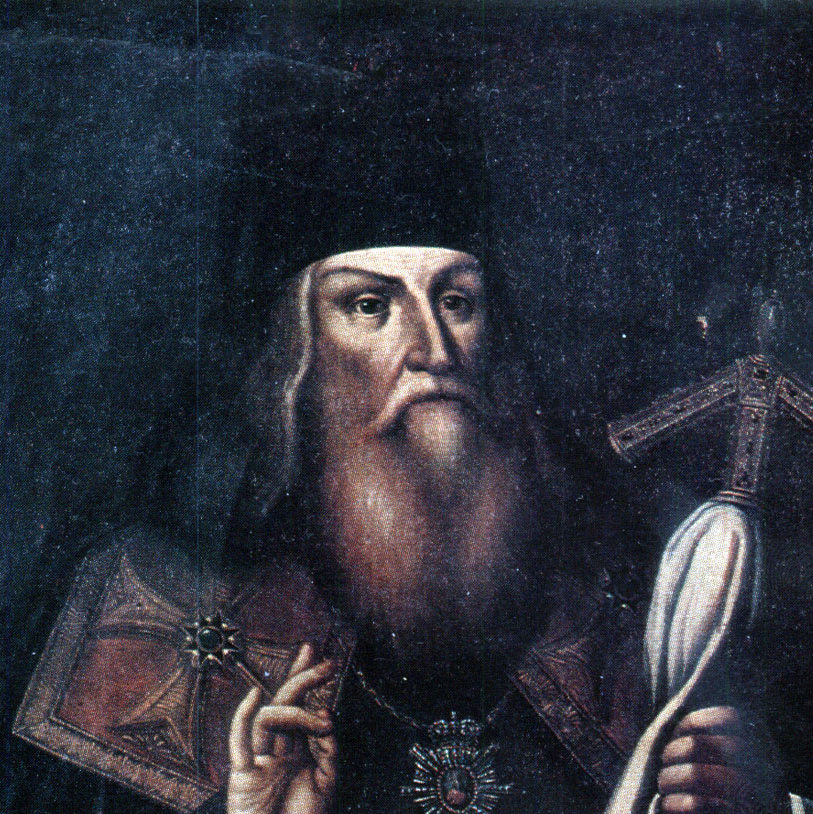
Lazar Baranovych (the secular name Luke; 1620, place unknown – September 13, 1693, Chernihiv) – a writer, church and political figure, teacher, Archbishop of Chernihiv and Novhorod-Siverskyi, professor and Rector of the Kyiv-Mohyla Collegium. He studied at the Kyiv Brotherhood School and, at the sponsorship of Petro Mohyla, in the collegiums of Vilnius (Lithuania) and Kalisz (Poland). From 1642 he taught at the Kyiv-Mohyla Collegium in elementary grades, later he became a professor of poetics, rhetoric, and philosophy. Since 1650 he was Rector of the Kyiv-Mohyla Collegium and at the same time the Hegumen of the Kyiv Epiphany Monastery. From 1653 he headed the Yelets Monastery of the Chernihiv Diocese. In 1657 he was consecrated Bishop of Chernihiv and Novhorod-Siverskyi. Simultaneously, for over 20 years, he was Head of the Kyiv Metropolitan Cathedra. He took an active part in the political and cultural life of the Hetmanate. On May 27, 1657 , he consecrated the hetman’s regalia at the Kyiv Brotherhood Monastery and handed them to newly elected Hetman I. Vyhovskyi. Around 1666 he was appointed Bishop of the Kyiv Metropolitanate. In 1667 he was promoted to Archbishop. In 1674 he established a printing house at Transfiguration Monastery in Novhorod-Siversk, which he transferred to Chernihiv in 1679. A literary center, later known as “Chernihiv Athenians,” was formed around the printing house. During Baranovych’s life, more than 50 books were published – primers, liturgical books, secular and religious works. He opened schools at temples and supported the Chernihiv school. He was buried in the Chernihiv Borisohlibskyi Monastery.
During the national liberation war of the Ukrainian people of 1648-1658, he made efforts to protect the Kyiv-Mohyla Collegium and the Kyiv Brotherhood Epiphany Monastery from downfall, involving Hetman B. Khmelnytskyi, I. Vyhovskyi, D. Mnohohrishnyi, and other secular and church figures. In Kyiv Brotherhood Monastery he created a choir and a choral school, where the students of the collegium studied.
Works:
1. Spiritual Sword [Меч духовний]. Kyiv,1666.
2.Lutnia Appollinowa. Collection of poetry. Lviv, 1671.
3 Trumpets of Preaching Words. [Труби словес проповідних]. – Kyiv, 1674.
4.Nowa Miara Stary wiary. – Lviv, 1676.
Source: Kyiv-Mohyla Academy Reflected in Names: XVII-XVIII, 2001.
Read moreIvan Vyhovskyi
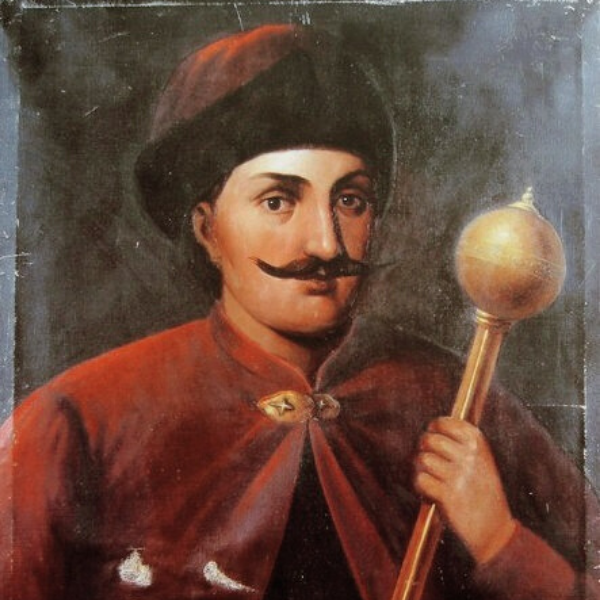
Vyhovskyi, Ivan Ostapovych, of the coat of arms of Abdank (appr. 1608 – 03/27/1664), Ukrainian military, politician, and statesman, Hetman of the Zaporozhian Army. He came from an Orthodox noble family. He had a good education. He probably studied at the Kyiv Brotherhood School or at the Kyiv Mohyla College.
He began his military career in the Polish Commonwealth (Rzeczpospolita) Army. Captured by Tatar troops during the Battle at Zhovti Vody, he was redeemed by B. Khmelnitsky, after which he became his closest ally and got the position of the general clerk. He headed the General Office – an important body under the Hetman, responsible for administrative and military affairs.
He participated in the battles near Pilyavtsy, Zbarazh, Zborov, Berestechko, Batog, Zhvanets, Lviv. Developed Zborivskyi, Bilotserkivskyi, and Pereyaslavskyi agreements. After Khmelnitskyi’s death, he became a regent under Yuri Khmelnitskyi. In 1657 he was elected Hetman of the Zaporozhian Army.
In 1658 he concluded the Treaty of Hadiach with royal representatives, which discussed, in particular, the creation of the Grand Principality of Russia. In 1569 he defeated the Moscow army in Konotop battle.
Under the pressure from the Cossack opposition, he relinquished the power of Hetman, joined to serve the Polish king, and held governments in Volyn, Podillya, and the Kyiv region. On suspicion of supporting and facilitating the anti-Polish uprising, he was arrested, deprived of his rights, and executed. There are several versions of the burial place of I. Vyhovsky and his wife: in Skit Manyavsky in Ivano-Frankivsk region, in the Yosypitsky monastery (now Yosypovychi village, Stryi district, Lviv region), or in the family estate in Ruda village (Zhidachiv district of Lviv region).
On October 27, 1657, it was at the Kyiv Epiphany Monastery that Archbishop Lazar Baranovich consecrated the Hetman Kleinodes and offered them to newly elected Hetman I. Vyhovsky. Under the Hadiach Treaty, the Kyiv-Mohyla College received the same privileges and rights as the Krakow Academy had: that of the second higher education institution in Central Europe after Charles University.
Source: Kyiv-Mohyla Academy Reflected in Names: XVII-XVIII, 2001.
Read moreMykola Petrov
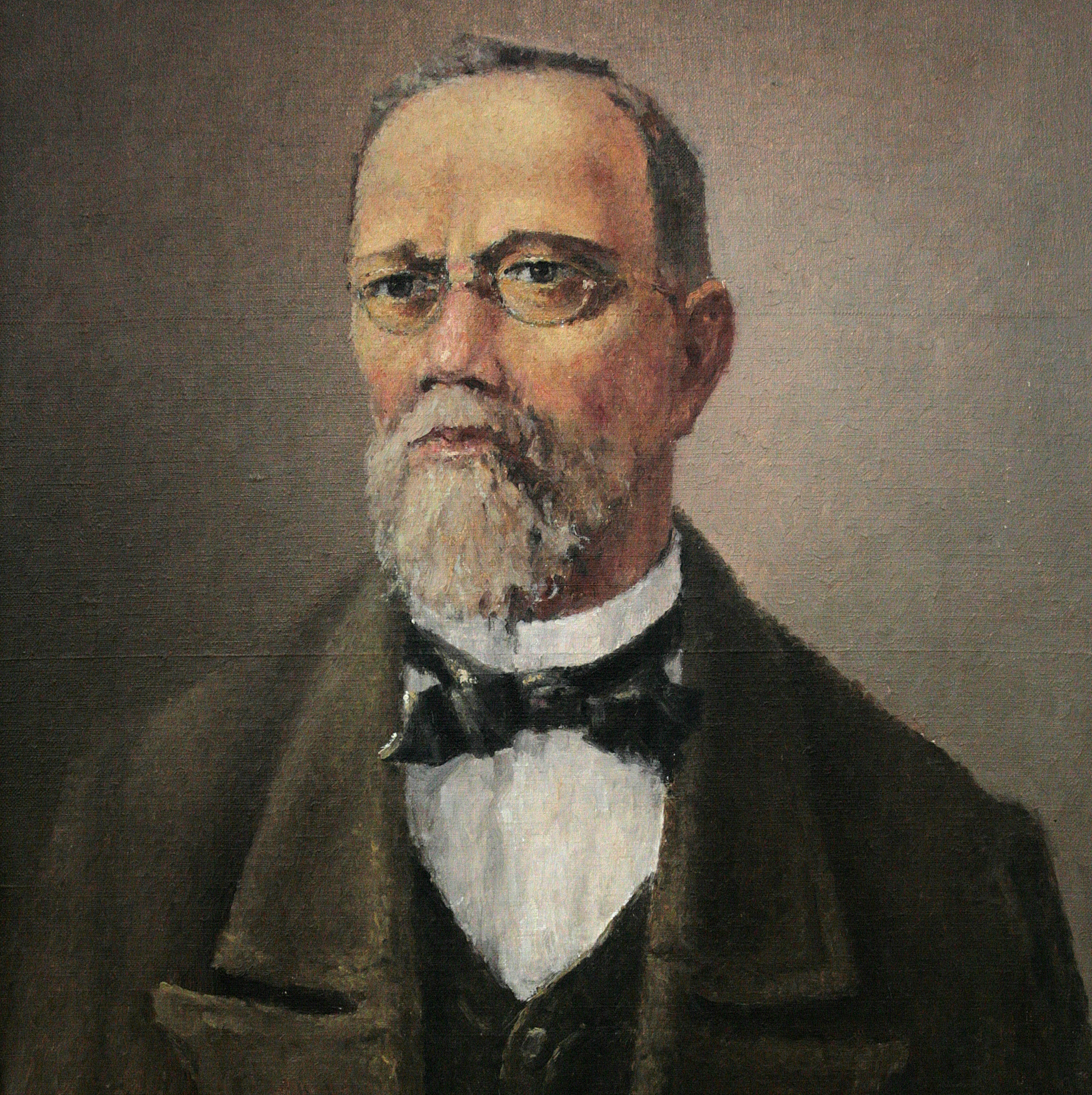
Petrov Mykola Ivanovych (24.04 [06.05] .1840, Voznesenske village of Makariivsky district of Kostroma province – June 21, 1921, Kyiv) – a graduate and teacher of Kyiv Theological Academy, literary critisist, historian, teacher, specialist in the field of church archeology, archeology and museology. Born in the family of a cantor. After graduating from the Makariivsky Theological School and the Kostroma Theological Seminary, in 1861-1865 he studied at Kyiv Theological Academy.
In 1865-18 he taught at the Volyn Theological Seminary in Kremenets, where he researched archival collections, in particular the history of the Kyiv-Mohyla Academy. In 1868, on the basis of the articles published in the journal Trudy Kievskoy Dukhovnoy Acadiemii [Proceedings of Kyiv Theological Academy] he received a Master’s degree.
In 1870-1911 he worked as an Associate Professor, later a Professor at Kyiv Theological Academy, teaching the general theory of literature and the history of foreign literature, the history of Russian literature, and later on – an overview of the history of Ukrainian literature. In 1875 he received a Doctorate in Theology.
In 1884-1887 he was the editor of the journal Kievskie Yeparkhialnyie Vedomosti [Kyiv Diocesan News] which were published in the academy. In 1912 he was elected an Honorary Member of Kyiv Theological Academy.
Mykola Petrov significantly contributed to the founding and development of the Church and Archaeological Society and the Church and Archaeological Museum at the Academy. Since the founding of the Church and Archaeological Society in 1872 and till its closing in 1917 Petrov worked as the secretary of this organization.
From 1878 to 1917 he worked as a keeper at the Church and Archaeological Museum, initiated the opening of the museum for visitors, was engaged in filling and researching of the museum fund, and prepared 5 issues of the Albom Dostoprimiechatielnostiey Tserkovno-Arkhieologicheskoho musieia [The Album of Sights of the Church and Archaeological Museum] (K., 1912-1915) for publication.
He was a member and Honorary Member of a number of academic societies and educational institutions, has repeatedly received awards and honors for his research works, and was awarded orders.
He died in Kyiv and was buried at the cemetery of the Kyiv Voznesensky Convent of Florivskyi Monastery.
Mykola Petrov was the author of several hundred books and articles on the history and theory of literature, history of the church, history of Kyiv-Mohyla Academy, Kyiv Theological Academy, local lore studies, church archeology, and museum science. In particular, he compiled five volumes of the collection Acty i dokumenty, otnosiashchiyesia k istorii Kievskoy academii. Otd. II (1721-1795) [Acts and documents relating to the history of Kyiv Academy. Part II (1721-1795)] (Kyiv, 1904-1908).
Source: Kyiv-Mohyla Academy Reflected in Names: XVII-XVIII, 2001.
Read moreOleksandr Koshyts
Koshyts Oleksandr Antonovych (also spelled as Alexander / Olexandr Koshetz) (13 [25] .08.1875, Romashky village of the Kaniv district, Kyiv oblast, now Myronivskyi district, Kyiv oblast – September 21, 1944, Winnipeg, Canada) – graduate of Kyiv Theological Academy, conductor, regent, composer, ethnographer, educator, memoirist. Born in the priest’s family.
In 1884-1890s he studied at Bohuslav Spiritual School, where he was deeply engaged in church music. In the years of 1890-1896 during his studies at Kyiv Theological Seminary, he paid the utmost attention to music and singing.
In 1897-1901 he studied at Kyiv Theological Academy, and simultaneously attended Kyiv Music School. In 1898-1901 he was the regent of the choir of the academy, greatly enriched its repertoire and, in particular, introduced in it the works by Artemy Vedel, the graduate of Kyiv-Mohyla Academy.
The choir of the Academy was one of the most prominent choirs in Kyiv under the regency of Koshetz. He started the systematic acquisition and arrangement of the musical library of the academy.
While working in the educational institutions of Stavropol, he carried out several ethnographic expeditions which resulted in the collection of about 500 Cossack folk songs. After the return to Kyiv in 1904, he taught at Kyiv Theological Seminary, led the choirs of the University of St. Volodymyr and of the Higher Women’s Courses and worked as a kapellmeister, conductor, and choirmaster at Mykola Sadovsky Theater and at the Kyiv Opera House.
During the time of the Ukrainian Central Rada (Central Council of Ukraine) in 1917, he took an active part in organizing the musical and theatrical life of Kyiv. In 1919-1926 Koshyts headed the Ukrainian Republican Chapel which performed a triumphal tour in Western Europe, North and South America. In the 1930s, living in the United States, he continued to engage in concert activities.
In 1920-1930 Koshyts productively composed in the genre of spiritual music and performed the arrangements of Ukrainian folk songs. As a composer and music director, he participated in the creation of the feature film Marusia based on the play by Mykhailo Starytsky Oy, ne khody, Hrytsiu, ta i na vechornytsi [Oh, Hryts, do not go to the evening parties] (Ukrfilm Corporation, 1938). Olexandr Koshyts died in Winnipeg. He is buried at the Glen Eden Cemetery near Winnipeg.
Read moreStepan Golubev
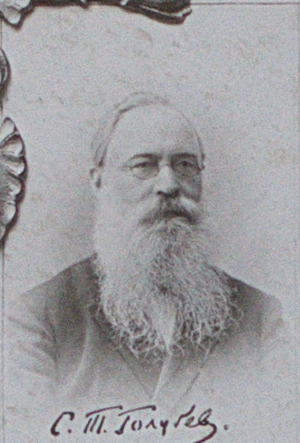
Holubev Stepan Timofiiovych (25.10 [06.11] .1848, Ardatovka village, Nyzhniolomovsky district of the Penza province – 22.11.1920, Kyiv) – a graduate and teacher of Kyiv Theological Academy, a historian of the church. Born in the priest’s family. After graduating from the Nyzhny-Lomovsky Theological School and Penza Theological Seminary in 1870-1874 he studied at the Church and History department of Kyiv Theological Academy.
In 1874 Stepan Holubev defended his thesis Petr Mohyla i Isaiia Kopinskii [Petro Mohyla and Isaiah Kopynsky]. From 1874 to 1912 he taught at Kyiv Theological Academy at the Department of Russian Church History. In 1883 he published a monograph Kievskii Mitropolit Petr Mohyla i iego spodvizhniki [Petro Mohyla, The Metropolitan of Kyiv, and His Associates] (vol.1). On the basis of its public defense he obtained a Master’s degree in Theology. In 1899 he earned a doctorate degree in Church History for the 2nd volume of the above study.
He was a member and during some time an assistant of the Secretary of the Church and Archaeological Society at the Academy. For many years of pedagogical activity he was awarded the State Orders and was elected an Honorary Member of the academy. He died in Kyiv, and was buried in the upper cemetery of the Kyiv Voznesensky Convent of Florivskyi Monastery.
In addition to monographic studies about Petro Mohyla, Stepan Holubev studied the history of Kyiv schools in the seventeenth and eighteenth centuries. In 1886 he published a research entitled Istoriia Kievskoy dukhovnoy acadiemii (Period domohilianskiy) [The History of Kyiv Theological Academy (The Premohylian Period)] which highlighted the history of the founding of the Kyiv Brotherhood School. He published a number of historical and literary artefacts on the history of the church in Ukraine in the 16th and 17th centuries. Не also published the studies on the history of Kyiv and its temples and monasteries.
Read morePamfil Jyrkevych
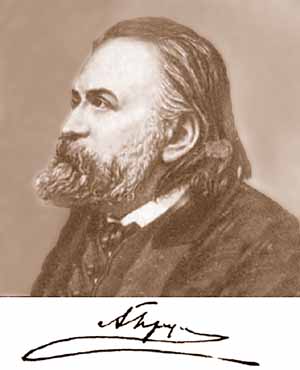
Yurkevych Pamfil Danylovych (16 [28] .02.1826, Lipliave town, Zolotonosha district of Poltava province – 04 [16]. 10.1874, Moscow) is a graduate and lecturer of Kyiv Theological Academy, a philosopher, teacher, and educator. Born in the priest’s family. After studying at Pereyaslav Theological School and Poltava Theological Seminary in 1847-1851s, he continued his education at Kyiv Theological Academy, where Yurkevych received a Master’s Degree in Theology and Philology.
In 1851-1861s he worked as a teacher, Bachelor and Professor at Kyiv Theological Academy, teaching the history of philosophy, logic, metaphysics, and the German language. Pamfil Yurkevych’s lectures won great popularity not only among the students of the academy but also among St. Volodymyr University students, and the philosopher himself had a significant moral authority in the students’ circles.
In 1861 he was transferred to the position of the Ordinary Professor of the newly opened Department of Philosophy at Moscow University, where he taught the history of philosophy, logic, psychology, and pedagogy. In 1869-1872s he was the Dean of the Faculty of History and Philology of Moscow University. He was awarded the orders and received the status of the state councilor. He died in Moscow, buried at the cemetery of the Moscow Saint Danil Monastery.
In 1883, in memory of Pamfil Yurkevych, his brothers deposited 6 thousand rubles to the account of Kyiv Theological Academy. And from the percentages of this deposit the scholarship was paid to the students of the Poltava Theological Seminary.
Pamfil Yurkevych belongs to the most prominent representatives of the philosophical thought of nineteenth century Russia. His philosophical works, translations, and lecture courses were published in academic journals and as separate editions, and much of his scholarly heritage remained in manuscripts.
Read moreAfanasii Bulgakov
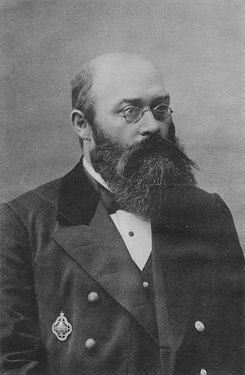
Bulhakov Athanasii Ivanovych (21.04 [03.05].1859, Boytychi village of the Bryansk district of the Orel province – 14 [27]. 03.1907, Kyiv) – graduate and teacher of Kyiv Theological Academy, theologian, church historian, and interpreter. Born in the priest’s family. After graduating from the theological school and theological seminary in Orel, he studied at the Church and History department of Kyiv Theological Academy. In 1887 he defended his thesis on the topic Ocherki Istorii Metodizma [Essays on the History of Methodism] and obtained a Master’s degree in Theology. From 1887 until the end of his life he worked at Kyiv Theological Academy holding the positions of Associate Professor of the Department of General Ancient Civil History and Professor of the Department of History and Analysis of Western Religions. He was a member of Epiphany Brotherhood at the Academy and was systematically involved in the preparation and reading of sermons on holidays.
Athanasii Bulhakov wrote nearly 60 works in theology, church and history, religion and journalism, many of which were published in the journal Trudy Kievskoy Dukhovnoy Acadiemii [Proceedings of Kyiv Theological Academy] in the 1880-1890s. Knowing a number of ancient and Western European languages, he translated the works of prominent medieval theologians into the Russian language. Athanasii Bulhakov died in Kyiv. He is buried at Baykove Cemetery.
Read moreVedel Artem
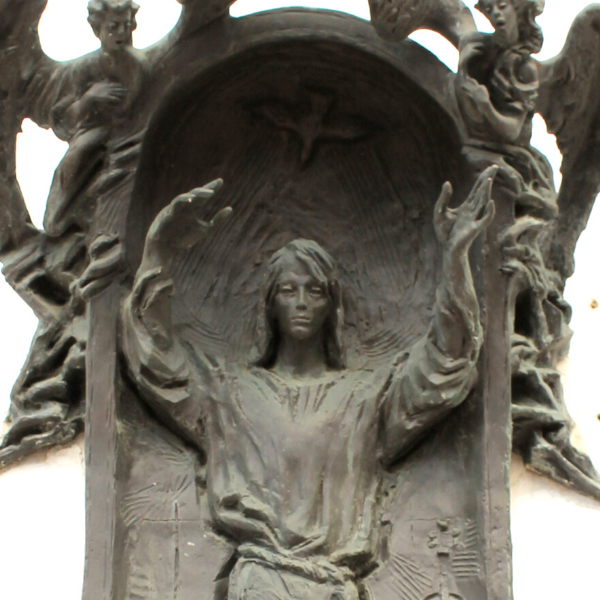
Vedel (Vedelsky) Artem Lukyanovich (1767, Kyiv – July 14, 1808, Kyiv) – composer, conductor, singer, violinist, and a student of Kyiv-Mohyla Academy. He was born in the family of Kyiv townspeople the Vedelskys in Podil.
In 1787 he graduated in philosophy from Kyiv-Mohyla Academy. Supposedly, in his senior years, the young man began to compose his own pieces and conduct the student choir and orchestra.
In 1788-1792 he was in Moscow, where he was sent because of his musical talents, and there he conducted local chapels, including the Governor-General Chapel, and was improving his musical skills. After returning to Kyiv in late 1792 and until 1796, Vedel directed the choir of Kyiv-Mohyla Academy, a music chapel at the Headquarters of the Infantry Corps, and a choir of soldiers’ children.
In 1796-1798 the musician worked in Kharkiv, where with the support of the Governor-General he organized a choir, orchestra, taught singing and music, and in particular, conducted a vocal class at the State College of Kharkiv College for Singers, who later worked in the chapels of St. Petersburg, Moscow. and St. Petersburg Metropolitan Choirs.
In 1799 he became a novice to the Kyiv-Pechersk Lavra, where he sang in the choir. According to one version, he was accused of prophecy about the murder of King Paul I, was declared insane and kept for 9 years in the Kiev insanity. He was buried in Shchekavichy Cemetery, which was destroyed in 1935.
At Kyiv-Mohyla Academy Vedel not only received a thorough education, completing a philosophy class, but also conducted a student choir and orchestra, performed as a soloist, vocalist and violinist, and began to compose music. It was studying in Kyiv that showed the talent of the young man and gave the necessary basic training and the impetus for the development of mastery, enabled the appearance of such a distinctive musical phenomenon as Vedel in European culture of the 18th century.
Despite the widespread popularity of Vedel’s musical works in the life of the composer and after his death, they were first published in the late nineteenth century. At present, there are 80 known works of the musician, including more than 30 choral concerts, 6 trios, 2 liturgies, and one secular chant. Most of A. Vedel’s choral concerts are written in the words of the psalms and continue the tradition of partisan singing – a church polyphonic choral singing, which is characteristic primarily of Ukrainian lands.
In Ukrainian territory, Vedel was one of the creators of a choral concert, the main genre of choral music of the classicist era, in the eighteenth century. His choral concerts organically combined the traditions of partisan singing, Western European classical forms, and the motifs of Ukrainian dumas (a type of Ukrainian folk songs), and laments.
Read moreKasian Sakovych
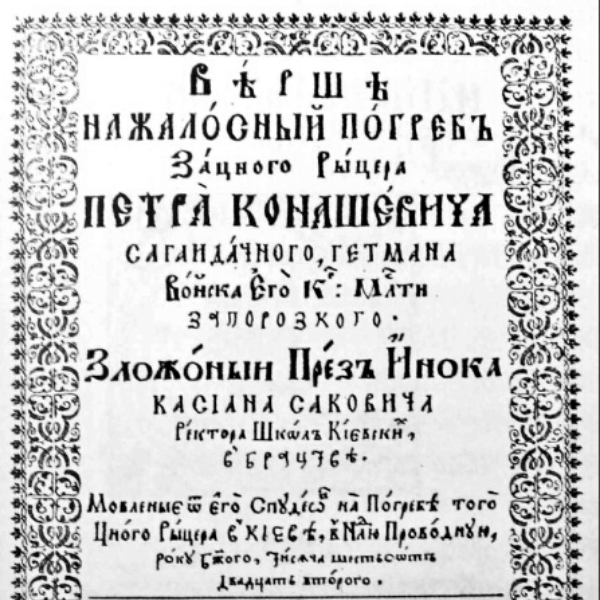
Sakovych Callist from the coat of arms of Corvin, the monastic name Kasiyan (1578, the town of Potelych of the Belz Voivodship, today: the village of Zhovkivsky district, Lviv oblast — 1647, Krakow) — the third Rector of Kyiv Brotherhood School, writer, preacher. The descendant of the Ruthenian boyar ancestry named Sakovych. Studied at Zamoysky and Krakow Academies. In 1620 he came from Przemysl to Kyiv and took monastic vows here. It is likely that he was a teacher in the family of the future Kyiv Governor Adam Kysil. While running Kyiv Brotherhood School in 1620-1624, he also taught poetics, rhetoric, and philosophy at school. He was one of the most educated figures of Kyiv Brotherhood School, who contributed to its strengthening and development. In 1624 — early 1625 he moved to Lublin, where he headed the Orthodox brotherhood. In 1625 he accepted the Union and became the archimandrite of the Dubniv Holy Transfiguration Monastery in Volyn. Becoming a catholic in 1641, he actively spoke as a polemicist against Orthodoxy.
Kasiyan Sakovych is the author of two works: Aristoteles problemata, albo Pytania o przyrodzeniu człoveczym [Aristotelian Problems, or Questions about the Nature of Man], Krakow, 1620, and Traktat o duszy [The Treatise on the Soul], Krakow, 1625. The works written during the rector’s practice at Kyiv Brotherhood School have a structure similar to the textbooks and, according to the author, at the beginning of the Traktat o duszy, the Polish edition originally was written in another language. It is likely that these works were originally lecture courses written in the Old Ukrainian language, and were taught to the students of Kyiv Brotherhood School. In addition to Sakovych’s pseudo-Aristotelian apocryphal text, the work Aristoteles problemata, albo Pytania o przyrodzeniu człoveczym also contains samples of the oratorical art as teaching material on rhetoric. The central ideas of the text are as follow: the human, the problems of Man’s self-cognition, the ability to control one’s emotions, mind and actions through self-study and education.
In 1620 Sakovych was present in the Epiphany Church of Kyiv Brotherhood Monastery when Patriarch of Jerusalem Theophanes III conducted the consecration of the Orthodox hierarchs with the support of Hetman Petro Sahaidachnyi and the Zaporizhian Army. He is the author of a well-known work Virshi na Zhalosnyi Pohreb Zatsnoho Rycera Petra Konashevycha Sahaidachnoho [Poems for the Mournful Funeral of the Honorable Knight Petro Konashevych Sahaidachnyi] written on the occasion of the death of Hetman in April 1622 in Kyiv. Twenty students of Kyiv Brotherhood School read those poems during the funeral ceremony. Soon, this composition, supplemented by the description of the emblem of the Zaporizhian Army, a preface, and an appeal Do Chytelnyka [To the Reader], was published as a separate book in Kyiv-Pechersk Lavra.
Read more